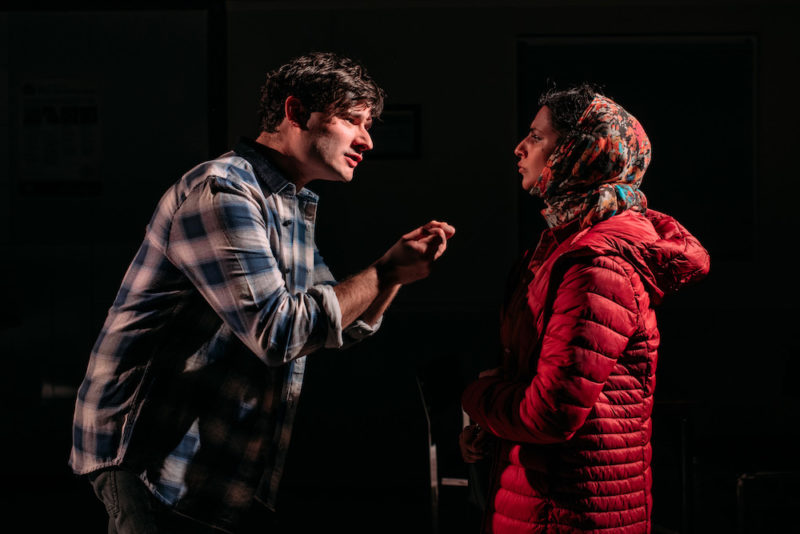I was reminded of something that my mam told me whilst I watched The Funeral Director play out at Home Manchester: “Death comes to us all. Whether we are Muslim, Hindu, Jew, or Christian. Whether we are white, brown or black. Whether we are straight or not. Whether we support City or we support the other lot. Yeah even them. Death does not discriminate”. The Funeral Director deals with death and discrimination, it’s challenging, provocative and a must see production this spring.
Iman Qureshi’s award winning play centres on the lives of the owners of a Muslim funeral parlour in a miserable Midlands town. Their attitudes to same-sex relationships are put under the microscope when they refuse to carry out the funeral rites to a gay Muslim. Qureshi’s play puts faith and homosexuality and it’s inevitable conflict up for debate, focussing primarily on Ayesha, a British Pakistani who harbours a secret and her husband, Zeyd, who as the play wears on gets ever more dogmatic.
What’s even more quirky is that the issues Qureshi’s play raises are quite topical, with the ongoing protests in Birmingham regarding teaching pupils about homosexuality garnering much publicity in the press and on television. Moreover, the media fascination with the Muslim community and it’s complicated relationship with the LGBT community has seen several features within the press.
It is worth pointing out that it is not only the Islamic faith that have these issues with the LGBT community but also many of the other monotheistic faiths. Indeed, religion has often had a problematic relationship with those wishing to pursue anything other than a hetrosexual realtionship.
Such subject matters therefore should be treated with some care and to some extent Qureshi’s play does exactly that. It traverses that delicate balancing act between being a patronising preacher and an over sympathetic evangelist. The writing perhaps wants to be too careful that it gives all parties a fair portrayal as it endeavours to engineer that debate.
Whilst its not perfect by any means, with its convenient plot changes, the under utilised characters, and the downbeat pace to proceedings, it would be churlish to focus on the flaws than to celebrate the potential in Qureshi’s play and in English Touring Theatre and Papatango Theatre’s enthralling production.
Given that for the most part of this 90 minute play is dominated by the two central characters, the actors playing these parts have to be on their game to connect with the audience. Aryana Ramkhalawon plays Ayesha’s tortured soul for all its worth, whilst Assad Zaman’s beleaguered husband, Zeyd, is a real highlight. The vibe to this piece is superb too from the mood music – some clever chosen tracks here – to the set design.
And for all its faults this play accomplishes something that other plays rarely do. It’s a show written by a member of an ethnic group that probably doesn’t get its time in the spotlight, challenging not just their own community but all to some serious questioning in an engaging play, featuring a cast that is diverse and more importantly that pushes those same groups to come and watch it.
Verdict: To some this will be a challenging and a controversial production. To others a conversation starter that is provocative and powerful. Either way, it is well written and well acted and a show that simply has to be seen. [usr 3 text=”false”]
